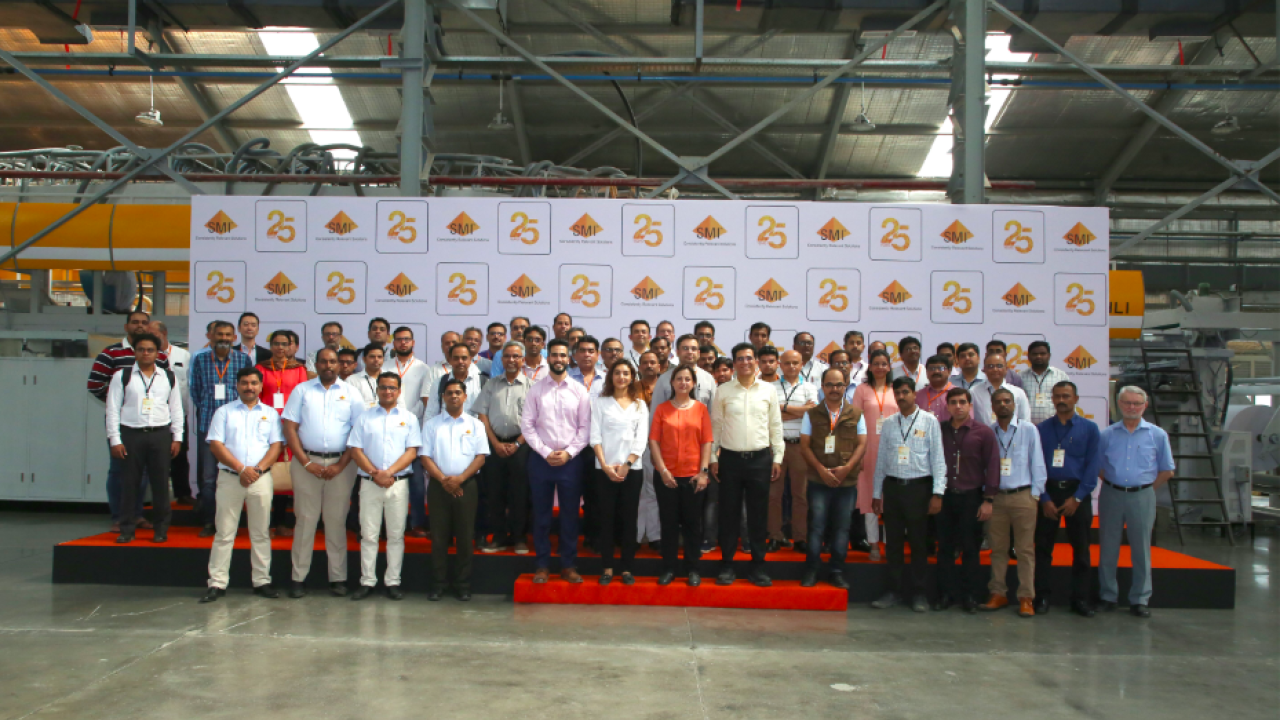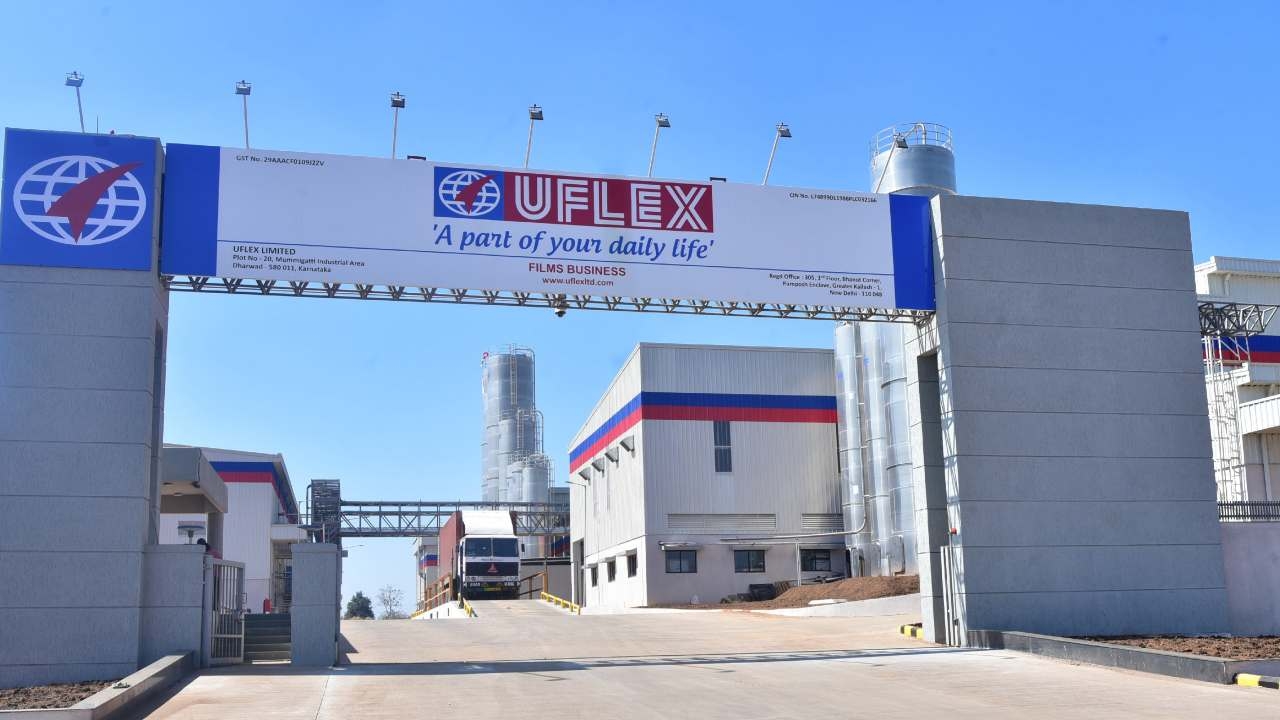SMI celebrates silver jubilee

The company that started in 1993 with just 11 people in Daman on a 750sqm plot today has a team of more than 200 in Ambernath. SMI Coated Products moved to its current location in 2008; it has been adding land and capacity to meet market demand – and growing at double digits – ever since. Its factory is now located on a 25,000sqm plot.
Mehta, along with his son and corporate director, Rohit Mehta, invited Indian label converters for the first time to demonstrate the state-of-the-art infrastructure that the company utilizes to manufacture 100 million sqm of labelstock every year.
During the tour, the duo led several groups, each of about 20 professionals from the Indian label industry, around the production floor, navigating their way through the raw material warehouse, slitting division and research and development centers.
This ISO 9001:2000 certified factory features a smart warehouse where each roll of raw material is code marked for easy and accurate access to its team. Clamp trucks handle rolls in another warehouse that are transported to the production floor, by any one of the designated team members, on recently placed tracks that facilitate almost effortless movement of material.
It is then coated on one of the seven coating machines. This includes the latest addition of a 60m in-line silicone and coating machine with a web width of 1,350cm, the installation of which was completed in 2019. Other coating machines include two hot melt coating lines, two acrylic emulsion adhesive lines and two silicone coating lines. Six of the seven coating machines on SMI’s factory floor have been made in India according to the company’s requirements.
Ancillary equipment includes two rewinding machines and four slitters.
Coated material is checked for quality on more than 30 parameters, such as peel adhesion, ageing test, temperature tolerance, conformability, heat resistance, printability and tamper evidence, among others.
Every approved roll is finally coded before it is dispatched to the customer. Any roll that does not meet all quality parameters is kept in a separate space in the factory, designated for faulty raw material or coated material.
Automated
This highly automated system is enabled by an ERP at the back-end that uses data to seamlessly connect all departments starting from receiving raw material to dispatch.
The impressive infrastructure resonates with the ‘Make in India’ sentiment catalyzed by the Indian government. SMI Coated Products attributes the successful expansion of its factory space to the demonetization announced by the government in November 2016. ‘New systems led to a change in the way people operated. While many businesses adapted, several had to shut shops. In a similar development, we were offered to buy the land adjoining our factory, an opportunity we grabbed, that facilitated our current expansion of the production floor and has given us tremendous scope to expand in the future,’ says Rohit Mehta.
The current infrastructure, with the latest investment in the new coating line, has brought the company’s manufacturing capacity to 190 million sqm. SMI Coated Products exports to 22 countries, including the Middle East, Africa and Australia, which contributes to 50 percent of its turnover.
‘Our focus now is to build on the current expansion and cater to industry requirements. SMI believes in growing with the industry and helping new as well as established converters with innovative solutions as well as small SKUs as low as 1,000sqm, if required,’ says Ajay Mehta.
Explaining how SMI customizes requests to ensure customer satisfaction, Rohit Mehta says, ‘We try to offer the most practical and workable material to our customers by requesting they respond to seven questions on our mobile app. These include understanding of application temperature, service temperature, curve diameter, finish of the label required, amongst others. We then perform a test in our laboratory to ensure the requirements are fulfilled and tweak the material, if required.’
SMI is thus well placed for future growth, which Ajay Mehta believes has started emerging from the surging middle class. ‘We constantly upgrade our systems and technology to grow with the market and make new products to cater to customers,’ he says.
With the emerging trend of variable data printing and emphasis on recycling and reusing products, some of the emerging requirements that the company sees in the Indian market include metallized films, wash-off labels and suitable labelstock for inkjet printing.
‘Converters are also demanding thinner labelstock material and we see more prominent usage of filmic labels now,’ says Ajay Mehta.
Sustainability
SMI has always been an advocate of sustainable business practices and reducing its impact on the environment. ‘We continue to push the industry to look at sustainability in true light and go for thinner materials without necessarily expecting a low price,’ explains Mehta. ‘Thinner materials with complex configurations can sometimes be marginally higher priced than standard labelstock. Converters and brand owners are now looking at ways to make a positive impact on the environment and not at the cost alone.’
SMI also advocates the use of PE instead of PP material on squeezable labels on larger containers which, he says, offers three advantages. First, instead of 86gsm film, a 46gsm film is used which reduces the consumption of plastic material by 50 percent. Secondly, PP is a domestic film so supports the ‘Make in India’ movement, and thirdly, reduced grammage and different constitution of the film brings down the cost of the label as well.
Ajay Mehta further suggests usage of filmic label on lubricant containers to completely avoid the problem of bubbles. ‘Paper labels contract in the day while the container expands and vice-versa at night. The paper contraction and expansion is based on the moisture and containers’ heat. So, if replaced with film, it removes all problems of bubbles,’ he explains.
As a step towards a greener future, SMI Coated Products is in the process of obtaining FSC certification. ‘FSC certified raw material will be sourced and maintained separately. It is different from regular labelstock in the way that the raw material is accounted for and its usage can be tracked. Though the FSC material is marginally higher priced, we will work towards combining it with thinner material so the cost impact on our customers is the bare minimum,’ assures Mehta.
Stay up to date
Subscribe to the free Label News newsletter and receive the latest content every week. We'll never share your email address.

